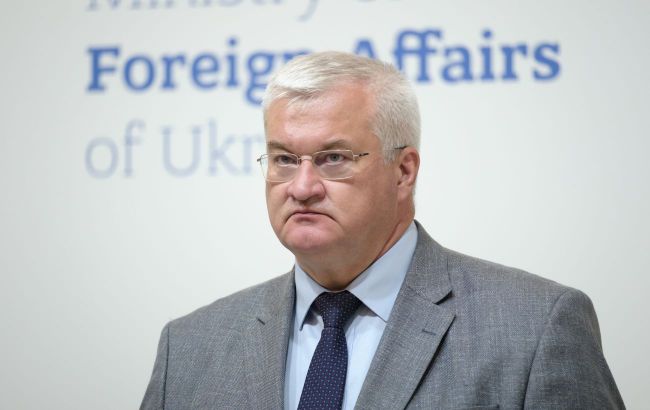Ukraine's Foreign Minister announces pressure plan on Russia
 Photo: Ukrainian Foreign Minister Andrii Sybiha (Vitalii Nosach, RBC-Ukraine).
Photo: Ukrainian Foreign Minister Andrii Sybiha (Vitalii Nosach, RBC-Ukraine).
President of Ukraine Volodymyr Zelenskyy has set Ukrainian diplomacy the task of putting pressure on Russia for a month. In particular, economic pressure, as well as restrictions on Russia's weapons production, Ukrainian Foreign Minister Andrii Sybiha says.
"We have an important month ahead of us. A month of pressure on the aggressor. A month of full diplomatic mobilization, full use of diplomacy to bring about a just and lasting peace for Ukraine," the Minister says.
He stresses that the key task is to limit Russia's ability to manufacture means of terror.
According to Sybiha, the diplomatic system is mobilizing all efforts ahead of important events. In particular, the EU and NATO summits, which will take place next week.
"The next month should be a month of pressure on Russia. Sanctions pressure. The adoption of new sanctions pacts, both at the EU level and at the level of national governments. If Putin and his cronies brazenly reject peace efforts, reject a truce, reject everything, they must suffer devastating economic blows. I emphasize - devastating," the Foreign Minister stresses.
The Minister clarifies that this primarily involves lowering the price cap on oil, strengthening secondary sanctions, closing loopholes, and denying Russian access to weapons components.
"We expect our partners to be decisive. Especially the United States of America. All these actions must be coordinated. We have the EU and its member states, the United Kingdom, the United States, Japan, Australia, and New Zealand. These are the world's largest economies and countries whose sanctions are most painful and damaging to Russia. They can be devastating to the Russian economy," the Foreign Minister emphasizes.
In addition, Sybiha says that the Russian economy is close to recession, and the brazen statements of Russian officials only confirm this thesis and the existence of systemic problems.
He calls for strengthening control over the implementation of already-imposed restrictions, as well as introducing secondary sanctions.
"They should be directed at the banking system, the Central Bank of the Russian Federation, large regional banks, and frozen assets. Fair decisions must be made that will allow them to be fully utilized right now. We are talking about the confiscation and use of assets for the needs of reconstruction and the purchase of weapons for Ukraine," Sybiha says.
Foreign Minister emphasizes the need to impose sanctions against anyone who helps Russia circumvent the restrictions. Sybiha assures that the relevant work is already underway.
The Minister places particular emphasis on large countries that are the largest importers of Russian oil.
"It is the proceeds from oil exports that are currently the main source of income for financing the Russian military machine. Therefore, we will direct all our efforts to stop the export of Russian oil by the shadow fleet to the countries that buy the most," the diplomat says.
Summing up, Sybiha adds that Zelenskyy tasked the diplomatic service with working to enlist the support of partners to enhance Ukraine's macrofinancial stability and energy security ahead of the next heating season.
Today, Ukrainian President Volodymyr Zelenskyy said that Russia rejected any peace proposals.
In this regard, Ukraine will work on a number of measures. In particular, strengthening sanctions, directing resources to the development of drones, and changing some personnel positions.

